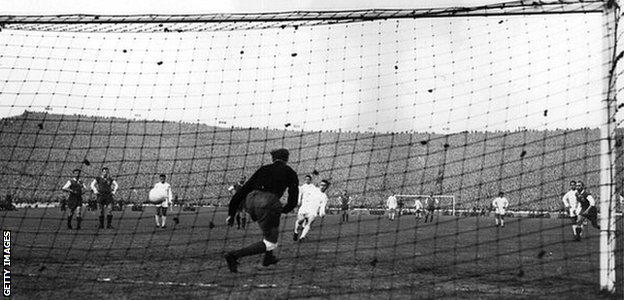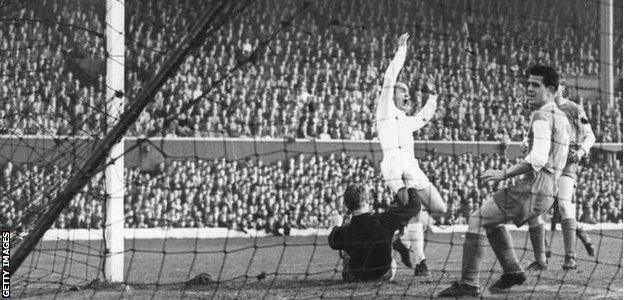When Eintracht Frankfurt's greatest XI was humbled at Hampden by Real Madrid
- Published

Ferenc Puskas scores one of his four goals against Eintracht Frankfurt in the final at Hampden
The way Paul Oswald, the Eintracht Frankfurt manager, remembered it, the Rangers fans were generous in defeat that night, cheering his players at the end of the 1960 European Cup semi-final at Ibrox and then gathering outside to cheer them again as they departed.
Maybe their generosity of spirit was down to pure admiration of the visiting Germans or maybe it was down to utter relief that, after a 180-minute tie that finished 12-4 on aggregate to Eintracht, they were about to see the back of them. Maybe it was a bit of both.
Certainly, a teenage Alex Ferguson remembers those games. "We thought those guys were Gods," the young Rangers fan and soon-to-be Rangers player said of Erich Meier, Dieter Lindner, and Alfred Pfaff, who scored nine of the goals between them. "They were the greatest team I'd ever seen in my life."
We all know what happened after that. Real Madrid accelerated into immortality in the final at Hampden and Eintracht just faded away into the world of what might-have-beens.
The night before the final, a youth player at Queen's Park by the name of the Andy Roxburgh managed to get a close-up view of Real in training. As if he didn't have enough to be astonished by in his heroes Ferenc Puskas, Alfredo Di Stefano and Luis del Sol, he couldn't take his eyes off Paco Gento, arguably the most exciting player in the global game that year.
In training, Gento stayed out on his favoured left wing, smoking, as his manager Miguel Munoz halted play to make a point. Once the action resumed, the scorer in Real's final victories in 1957 and 1958 flicked the cigarette to the floor and took off like a missile, seizing on a pass, dribbling inside before lashing a shot into the net then returning for another puff.
In the game of the century in front of 127,621 at Hampden, Eintracht became the other team, taking the lead, then hitting a post at 1-0 before famously losing 7-3 in one of the greatest football exhibitions the game has ever known.
Ferguson said he couldn't believe his eyes that the gang of invincibles he'd seen inflict such pain on Rangers were now themselves being made to suffer.
Eintracht had no superstars. They didn't have a solitary player in West Germany's World Cup squad two years before and none again two years later, but they still had quality.
They had Erwin Stein, a physical striker with pace and a deadly finisher who'd scored 24 goals in 30 games in the German Oberliga and another seven in five in the cup. Stein's understanding with Richard Kress, the outside right, was uncanny. Kress was lightning quick himself. The outside left was Meier. In the middle of the park they had Lindner and Pfaff.
On their way to the final, Eintracht scored 20 goals in six games. Glasgow folk queued down the street and around the corner on the day tickets went on sale.

Alfredo di Stefano celebrates putting Real into a 2-1 lead at Hampden
In the years since, the players involved have spoken of the atmosphere at Hampden, the extraordinary noise, the huge understanding and appreciation the people had for what they were seeing, which was greatness, nothing less.
The special nature of if was only heightened when Eintracht exploded out of the blocks. Meier hit the crossbar inside a minute. Kress and Pfaff forced saves out of Rogelio Dominguez soon after. Then Kress scored. Hampden, willing on the underdogs, erupted.
"Their goal was like a sting from a huge bee," the great Real defender Jose Santamaria told the Guardian. "Suddenly, you're desperate, frantic, you've just got to get that sting out quick. You react. They were shocked by it. They didn't know what to do and their level dropped. Our mentality was: 'Right, let's go for them'. It was like Frankfurt had provoked us."
Once Real settled, the full majesty of the team unfolded and it was Di Stefano, as ever, who orchestrated it. He was 34 and no longer went by his early nickname, the Blond Arrow, but he was still the man - arrogant and brilliant in equal measure. Even in the twilight of his career his stamina and ability to control games was breathtaking. Everything went through him.
Di Stefano was many players in one. He was an attacking midfielder, a defensive midfielder and a centre-forward. Eintracht weren't the only team to lose themselves in trying to deal with him. He'd scored in each of the previous four European Cup finals and here he netted again to make it 1-1 and once more to make it 2-1.
Puskas scored the next four as Real's short passing networks did for Eintracht. They knew of Puskas' ruthlessness but couldn't shut him down. They knew of the burning pace of Gento on one side and the exquisite, almost forgotten, Brazilian Canario on the other but couldn't hold them back. They knew what Del Sol could do but his rapid movement was too much for them.
Above all, they feared Di Stefano's threat but didn't know how to cope with him when he dropped deep to conduct and then arrived undetected in the box to threaten. He was a shadow to them.
This was a Real team so talented that they could afford to leave out Didi. He was player of the tournament when Brazil won the World Cup two years earlier. He won another World Cup in 1962. Good enough for Brazil, but not good enough for Real.
Eintracht never gave up that night. Stein made it 6-2 before Di Stefano claimed his hat-trick. Then Stein scored again to make it 7-3. Real now had five European Cups. They had become immortal. Eintracht? A fine team, remembered by Eintracht people but probably forgotten by most others.
"The whistle blew, the ball was with me," said Santamaria about the end-game at Hampden. "I picked it up and was walking towards the centre-circle when Stein asked for it. At first, I wasn't having any of it but after the third time he asked, I thought: 'I really want this ball, but this guy has scored two and lost the match. It's the least I can do', so I gave it to him."